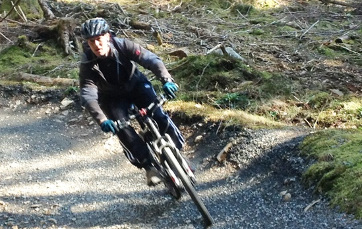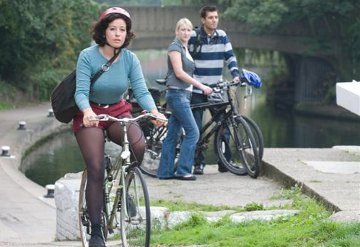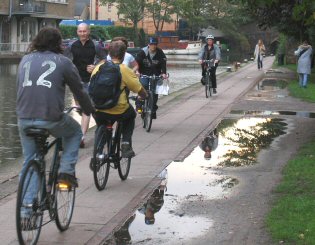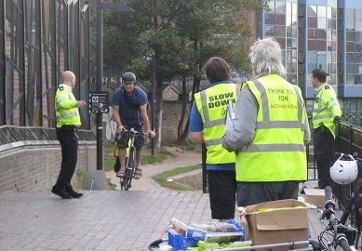JUST having had another a close call with a cyclist on the towpath while walking the dog, Mick Fitzgibbons believes it is time to give the Trust another reminder.
When I first came onto the canals and rivers the towpath was used by people for a wide variety of different purposes. Some uses were quite unpleasant, such as when the towpath was used as a dog exercise area and latrine or for that perennial problem, householder fly tipping. At the same time, you would often see groups of walkers as well as the odd bird watcher and the ever present cohort of leisure or match fishermen. You would also see the occasional cyclist who would be limited in the speed of progress because of the conditions underfoot.
A gradual change
There was a gradual change and most noticeable was the decline in numbers of fishermen. Sections of canal and rivers which had been managed by fishing clubs seem to gradually fade as the numbers of users fell. The number of organised competitions matched the falling numbers of those having a days leisure fishing.
At this time there was a significant change in the cycling world. Now came the advent of the 'Mountain Bike' an all terrain vehicle, designed and built to tackle rough ground as the name would suggest. When you buy a bike, you make a choice of how you intend to use it. The off road cycling phenomena had arrived.
 High performance bikes
High performance bikes
Gas suspension, high grip tyres, multi-geared systems and disk brakes have taken over from the round town, sit-up-and-beg cycles of yesterday. Now bikes are high performance vehicles with prices to match. Where at one time the towpath would have limited the speed of progress. Now cycling over rough terrain on a high performance bike is part of the challenge.
 British Waterways, and now the Trust, in their wisdom have started to upgrade sections of the towpath—which in itself is no bad thing. It has also started to encourage the public including cyclists to use the towpath. But in a Kafkaesque unintended consequence, at the same time creating a significant problem. There must be few boaters who have not experienced the high speed antics of a significant number of cyclists—though there are cyclists that are polite and considerate when passing. This is a note-worthy and exceptional behaviour and not what normally transpires.
British Waterways, and now the Trust, in their wisdom have started to upgrade sections of the towpath—which in itself is no bad thing. It has also started to encourage the public including cyclists to use the towpath. But in a Kafkaesque unintended consequence, at the same time creating a significant problem. There must be few boaters who have not experienced the high speed antics of a significant number of cyclists—though there are cyclists that are polite and considerate when passing. This is a note-worthy and exceptional behaviour and not what normally transpires.
 Clocked for speeding
Clocked for speeding
The Radio 2 presenter Jeremy Vine was 'clocked' speeding on his bike in Hyde Park. He was informed that the speed limit in Hyde Park is 5mph. Vine was travelling at more than three times the limit for the area at 16 mph. There are recognised speed limits both on our roads and in our parks. The speed limits are set to reduce accidents and especially fatalities. By way of comparison, there is no specific speed limit for cyclists on the towpath. Yes, that's right, there are maximum speed restrictions for boats, but the towpath is a no limit, free-for-all zone for cyclists.
 Now as the Trust embarks on its 'charm offensive' for the cycling lobby. As it now goes out of its way to bring families onto the towpath. You must question the sense in not having a blanket speed limit set for safety as there is in Hyde Park. Because if travelling at over 5mph in Hyde Park is considered as being dangerous. It will be equally if not more dangerous when confining walkers, anglers and boaters into a very narrow high speed danger zone.
Now as the Trust embarks on its 'charm offensive' for the cycling lobby. As it now goes out of its way to bring families onto the towpath. You must question the sense in not having a blanket speed limit set for safety as there is in Hyde Park. Because if travelling at over 5mph in Hyde Park is considered as being dangerous. It will be equally if not more dangerous when confining walkers, anglers and boaters into a very narrow high speed danger zone.
Lost the plot?
Has the Trust lost the plot—well by way of an example: As the 'Sustrans cycleways' (Note the change of name from towpath to cycleway) get rolled out along sections of canal. Canals such as the Basingstoke Canal where signs have been installed not giving the distance to places, but timings to places. So each is now set with a guide time—just what every cyclist needs—encouragement to see how quickly they can do the distance and by what amount they can break the timing.
Sustrans claims that it is the pioneer of the 'Safe Routes' concept in the UK. Just as CaRT claims to be the answer to the vexed problem of maintaining the inland waterways infrastructure.
You can't make it up!
